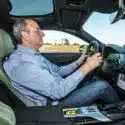Understandably the various enthusiast forums around the world have been whipped into something approaching a frenzy by the news that the Nürburgring has effectively gone bust. Modern media communications and social networking has meant the place has acquired a status far greater than when the old Nordschleife was used for top flight motorsport. Even those who wouldn’t know their Fuchsröhre from their Pflanzgarten are having anxiety attacks about its plight.

As well they might. The situation as I understand it is that the facility has debts of nearly €500 million and is unable to service a €330 million bank loan. The circuit is owned by the state of Rhineland-Palatinate whose prime minister is currently blaming the EU for the circuit’s woes because they have refused to cough up millions of extra Euros in bail out loans.
He should look closer to home. The Nürburgring’s misfortunes started in 2004 when a decision was made to turn the place into a leisure complex complete with vast, shiny hotels despite the fact that the circuit is miles from anywhere interesting and had no brand value as an amusement park.
It turned the place into a visual monstrosity, a posh Pontins but with less charm. To be fair it has managed to host the odd car launch from the sparkling new Linder hotel that’s been built there, which is the only reason I know that on the two occasions I’ve stayed there, the place has been a ghost town. Regular ‘Ring goers used to be quite rude about the old and ugly Dorint next door, but by comparison it seems suffused with character and the stench of history. I last went to the ‘Ring at the end of last year to do a two hour race for Mercedes-Benz Classic. Did we stay at the Lindner? We did not. Mercedes instead chose a small and delightful family run guest house a couple of miles down the road and none of us would have had it any other way.
For most people, whether it’s to do a track day or as one of the hundreds of thousands who attend the 24 hour race there, a trip to the Nurburgring is a pilgrimage. It’s a chance to walk in your heroes’ footsteps, immerse yourself in all that has gone on in the lifetime it has been in use. It is broadly held to be the venue of the greatest Formula 1 race ever staged, when in 1957 Fangio won his and Maserati’s last Grande Epreuve by driving like no other human could. It’s also a place of quiet contemplation, for thinking about hundreds who were killed or fearfully injured there. Disneyland on wheels it ain’t.
In the end, however, history is not going to save it. If all it had going for it was nostalgia, the weeds would be growing under Antoniusbuche Bridge within weeks. In fact salvation lies not in the hands of spectators, track-day warriors, VLN competitors or Bernie Ecclestone.
But saved the circuit will be, or at least that part of it that matters to you or me. Truth is the Nordschleife has never been busier and the car manufacturers who’ve invested millions building workshops there and whose staff spend millions of man hours pounding are not going simply to walk away. Fact is if you’re developing the suspension and tyres of a new road car, there’s nowhere else on earth like it. And it’s great for PR too: I can’t remember the last Jaguar launch I attended where its top press honcho didn’t mention the fact that its cars are developed there.
I don’t want to predict the future but you don’t need to be Mystic Meg, either to see the creditors parceling off the Nordschleife for sale as a single asset, nor the queue of car manufacturers that might line up to buy it. As for the rest, if the jobs of those who work there are lost already as they may well be, I’d bulldoze the lot of it.






